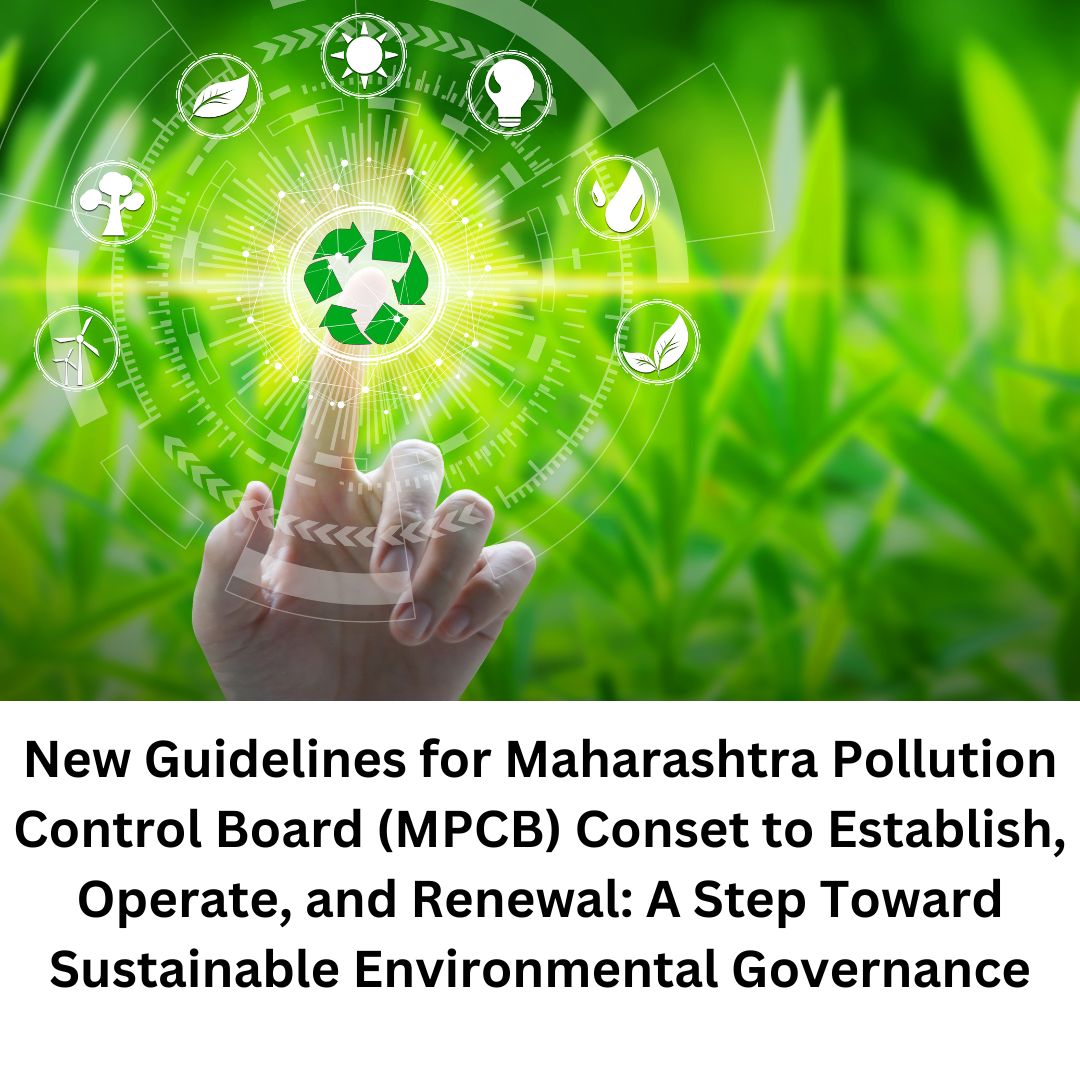Blog Details

New Guidelines for Maharashtra Pollution Control Board (MPCB) Consent to Establish, Operate, and Renewal: A Step Toward Sustainable Environmental Governance
The Maharashtra Pollution Control Board (MPCB), one of the leading state-level regulatory bodies in India, has taken a significant step toward enhancing environmental protection and sustainable industrial growth in 2025. With several new guidelines and circulars released throughout the year, including the landmark updates in July 2025, the MPCB has emphasized streamlined consent procedures, strict pollution control standards, waste management frameworks, and the adoption of digital governance. These measures aim to balance industrial development with ecological sustainability in Maharashtra, one of the most industrially advanced states in India.
This blog explores the key highlights of the new MPCB guidelines, their impact on industries and communities, and why these changes matter for a cleaner and greener Maharashtra.
1. Simplified Consent Procedures
Auto-Renewal Scheme
- → The MPCB has introduced a self-declaration-based auto-renewal scheme for Red, Orange, Green, and newly added Blue category industries.
- → Reduces paperwork and long waiting periods through a trust-based mechanism.
- → A corrigendum in September 2025 clarified operational aspects for smooth implementation.
Green Category Consent Simplification
On August 26, 2025, a circular was issued simplifying consent procedures for Green Category industries, reducing compliance burdens and expediting approvals.
White Category Expansion
In June 2025, 222 new industries were added to the White category (virtually non-polluting). These now require only a simple self-certification on the MPCB portal.
2. Industrial and Waste Management Guidelines
Industrial Sector Classification
MPCB aligned its industry categories (Red, Orange, Green, White, Blue) with Central Pollution Control Board (CPCB) norms, promoting national consistency.
Ready-Mix Concrete (RMC) Plants
- → Wastewater treatment: Must collect, treat, and reuse vehicle washing wastewater.
- → Noise control: Must comply with Noise Pollution Rules, 2000.
- → Solid waste management: Mandates recycling or authorized disposal.
Biomedical Waste Management
In April 2025, MPCB implemented a bank guarantee scheme for Health Care Establishments (HCEs) and Biomedical Waste Facilities to improve accountability and compliance.
Plastic Waste Regulations
PIBOs and Plastic Waste Processors must now register on the CPCB’s centralized EPR portal to enhance plastic waste traceability and enforce responsibility.
3. Idol Immersion Guidelines
- → Eco-Friendly Idols: Encouraged use of idols under 6 feet made from natural materials (August 2025).
- → POP Idols: Subject to strict disposal and immersion guidelines (August 2025).
- → Immersion Sites: SOPs provided to identify safe immersion locations and prevent water pollution.
4. Digital and Administrative Reforms
- → In August 2025, MPCB offices began a full transition to a paperless working system.
- → OTP-based login for technical officers implemented in June 2025.
- → In September 2025, liaison officer credential updates were mandated on the IMIS Web-Portal.
- → Penal fees for non-compliance introduced in line with the January 2025 MoEFCC notification.
5. Impact of the New Guidelines
- → For Industries: Reduced compliance cost and time, with increased accountability.
- → For the Environment: Improved pollution control through stricter waste and emissions norms.
- → For Communities: Better urban conditions and public health protection through festival and industrial regulation.
- → For Governance: Transparent, paperless systems strengthen institutional efficiency.
6. Why These Changes Matter
- → Supports ease of doing business without compromising environmental integrity.
- → Demonstrates firm commitment to pollution and waste reduction.
- → Merges cultural values with eco-friendly policies (e.g., idol immersion SOPs).
- → Advances Maharashtra’s leadership in sustainable governance.
Conclusion
The MPCB’s new 2025 guidelines, especially those from July, reflect a visionary and multi-dimensional approach to environmental governance. From simplifying compliance to enforcing accountability and modernizing operations, these measures pave the way for Maharashtra’s sustainable future.
As industries grow, these regulations will ensure that progress is aligned with ecological preservation. MPCB’s framework proves that industrial development and environmental stewardship can coexist.
Why Choose Ascent Inspecta for MPCB Consent?
Obtaining consent from the Maharashtra Pollution Control Board (MPCB) is essential for all operating industries. Whether it's Consent to Establish (CTE), Consent to Operate (CTO), or renewal under Red, Orange, Green, Blue, or White categories, navigating the legal and procedural maze can be complex. This is where Ascent Inspecta plays a critical role.
- → Expert support for complete MPCB consent cycle—from documentation to final approval.
- → Deep understanding of the latest 2025 MPCB updates including auto-renewal and digital reforms.
- → Timely portal updates and liaisoning with MPCB officials for smooth compliance.
- → End-to-end assistance across all industry categories, from high-risk Red to self-certified White.
- → Proven success in ensuring faster approvals, reduced delays, and regulatory peace of mind.
By choosing Ascent Inspecta, you gain a trusted compliance partner committed to your sustainable growth. Let us handle the complexities of MPCB, so you can focus on driving your business forward.
Leave a Comment
We would love to hear your thoughts! Please leave your comment below:
